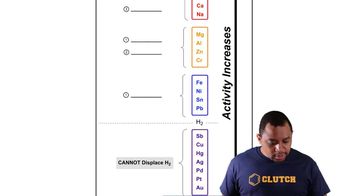What reaction can occur, if any, when the following experiments are carried out under standard-state conditions? (b) A strip of lead is dipped into an aqueous solution of AgNO3.
What reaction can occur, if any, when the following experiments are carried out under standard-state conditions? (a) A strip of zinc is dipped into an aqueous solution of Pb(NO3)2.

Verified Solution
Key Concepts
Redox Reactions

Standard-State Conditions

Activity Series of Metals

What reaction can occur, if any, when the following experiments are carried out under standard-state conditions? (c) Chlorine gas is bubbled through aqueous H2C2O4.
What reaction can occur, if any, when the following experiments are carried out under standard-state conditions? (d) A nickel wire is dipped into an aqueous solution of HClO.
What reaction can occur, if any, when the following experiments are carried out under standard-state conditions? (b) An acidic solution of FeSO4 is exposed to oxygen.
What reaction can occur, if any, when the following experiments are carried out under standard-state conditions? (c) A silver wire is immersed in an aqueous solution of NiCl2.
What reaction can occur, if any, when the following experiments are carried out under standard-state conditions? (d) Hydrogen gas is bubbled through aqueous Cd(NO3)2.
